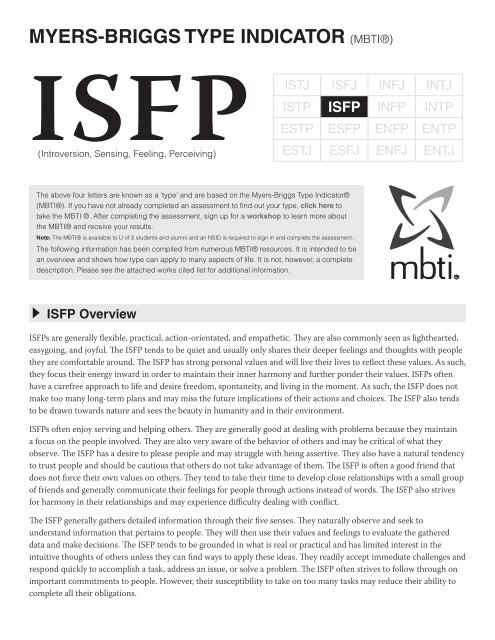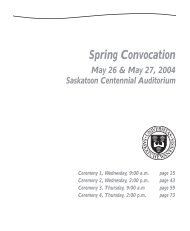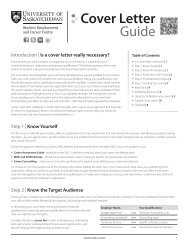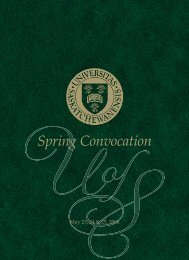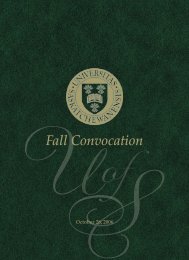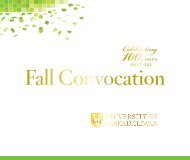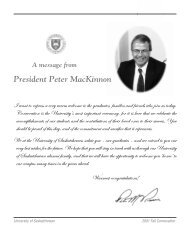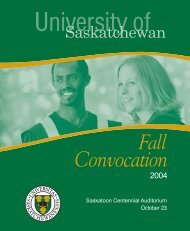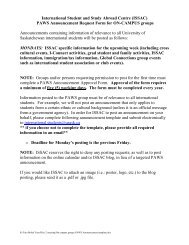isFp - Students - University of Saskatchewan
isFp - Students - University of Saskatchewan
isFp - Students - University of Saskatchewan
Create successful ePaper yourself
Turn your PDF publications into a flip-book with our unique Google optimized e-Paper software.
Myers-Briggs Type indicaTor (MBTI®)<br />
ISFP<br />
(Introversion, Sensing, Feeling, Perceiving)<br />
The above four letters are known as a ‘type’ and are based on the Myers-Briggs Type Indicator®<br />
(MBTI®). If you have not already completed an assessment to find out your type, click here to<br />
take the MBTI ®. After completing the assessment, sign up for a workshop to learn more about<br />
the MBTI® and receive your results.<br />
note: The MBTI® is available to U <strong>of</strong> S students and alumni and an NSID is required to sign in and complete the assessment.<br />
The following information has been compiled from numerous MBTI® resources. It is intended to be<br />
an overview and shows how type can apply to many aspects <strong>of</strong> life. It is not, however, a complete<br />
description. Please see the attached works cited list for additional information.<br />
<strong>isFp</strong> overview<br />
ISTJ ISFJ INFJ INTJ<br />
ISTP <strong>isFp</strong> INFP INTP<br />
ESTP ESFP ENFP ENTP<br />
ESTJ ESFJ ENFJ ENTJ<br />
ISFPs are generally flexible, practical, action-orientated, and empathetic. They are also commonly seen as lighthearted,<br />
easygoing, and joyful. The ISFP tends to be quiet and usually only shares their deeper feelings and thoughts with people<br />
they are comfortable around. The ISFP has strong personal values and will live their lives to reflect these values. As such,<br />
they focus their energy inward in order to maintain their inner harmony and further ponder their values. ISFPs <strong>of</strong>ten<br />
have a carefree approach to life and desire freedom, spontaneity, and living in the moment. As such, the ISFP does not<br />
make too many long-term plans and may miss the future implications <strong>of</strong> their actions and choices. The ISFP also tends<br />
to be drawn towards nature and sees the beauty in humanity and in their environment.<br />
ISFPs <strong>of</strong>ten enjoy serving and helping others. They are generally good at dealing with problems because they maintain<br />
a focus on the people involved. They are also very aware <strong>of</strong> the behavior <strong>of</strong> others and may be critical <strong>of</strong> what they<br />
observe. The ISFP has a desire to please people and may struggle with being assertive. They also have a natural tendency<br />
to trust people and should be cautious that others do not take advantage <strong>of</strong> them. The ISFP is <strong>of</strong>ten a good friend that<br />
does not force their own values on others. They tend to take their time to develop close relationships with a small group<br />
<strong>of</strong> friends and generally communicate their feelings for people through actions instead <strong>of</strong> words. The ISFP also strives<br />
for harmony in their relationships and may experience difficulty dealing with conflict.<br />
The ISFP generally gathers detailed information through their five senses. They naturally observe and seek to<br />
understand information that pertains to people. They will then use their values and feelings to evaluate the gathered<br />
data and make decisions. The ISFP tends to be grounded in what is real or practical and has limited interest in the<br />
intuitive thoughts <strong>of</strong> others unless they can find ways to apply these ideas. They readily accept immediate challenges and<br />
respond quickly to accomplish a task, address an issue, or solve a problem. The ISFP <strong>of</strong>ten strives to follow through on<br />
important commitments to people. However, their susceptibility to take on too many tasks may reduce their ability to<br />
complete all their obligations.
2<br />
Myers-Briggs Type indicaTor (MBTI®)<br />
<strong>isFp</strong> and school<br />
Learning<br />
The ISFP student will <strong>of</strong>ten…<br />
• Learn most effectively through practical application and hands-on experience<br />
• Struggle with traditional teaching that focuses on theory or abstract thinking<br />
• Be interested in topics that pertain to people<br />
• Prefer adaptable pr<strong>of</strong>essors that present material in a clear manner<br />
• Doubt implications <strong>of</strong> good test scores and underestimate their capabilities<br />
• Prefer a quiet study environment<br />
Writing<br />
Student Employment & Career Centre<br />
ISTJ ISFJ INFJ INTJ<br />
ISTP <strong>isFp</strong> INFP INTP<br />
ESTP ESFP ENFP ENTP<br />
ESTJ ESFJ ENFJ ENTJ<br />
The ISFP generally excels at descriptive writing that is based on what they experience. They are <strong>of</strong>ten inspired to write<br />
on topics that reflect their interest in nature or people. However, they may find writing on personal experiences to be<br />
difficult due to their desire for privacy. The ISFP may also struggle with logically analyzing topics. In their writing, the<br />
ISFP tends to consider their audience but should be cautious that they are not writing only to please the reader.<br />
In the writing process, the ISFP will <strong>of</strong>ten…<br />
• Begin by gathering and reflecting on information<br />
• Need to limit the amount <strong>of</strong> information they gather<br />
• Organize their writing based on a step-by-step process and established model<br />
• Require a quiet environment that is free <strong>of</strong> distractions<br />
• Practically apply the information that they gather<br />
• Desire positive feedback and encouragement from their audience<br />
• May need to return to the original draft to strengthen the conclusion and omit unnecessary details or stories<br />
procrastination<br />
The ISFP’s preference for keeping things open-ended tends to influence their procrastination in completing tasks.<br />
They may also avoid or put <strong>of</strong>f work that is deemed irrelevant or uninteresting. At times it can also be difficult for the<br />
ISFP to delay their desire for immediate enjoyment in order to obtain long-term academic achievement. The ISFP may<br />
increase their motivation by connecting their efforts to helping people, maintaining harmony, or pleasing others. It is<br />
also important for the ISFP to outline a project plan that includes rewards. As well, the ISFP would likely decrease their<br />
procrastination by further developing their time management skills.<br />
Student Employment & Career Centre • <strong>University</strong> <strong>of</strong> <strong>Saskatchewan</strong> • 97 Campus Drive • Saskatoon SK S7N 4L3<br />
Tel: 306-966-5003 • Fax: 306-966-5092 • E-mail: student.employ@usask.ca • Website: www.usask.ca/secc
Myers-Briggs Type indicaTor (MBTI®)<br />
<strong>isFp</strong> and career exploration<br />
An ISFP tends to find career satisfaction with careers that have the following characteristics:<br />
• Reflects their inner values and fulfills a greater purpose, meets a need, or helps others<br />
• Ensures task variety and projects <strong>of</strong> interest<br />
• Fosters a supportive, positive, and cooperative work environment<br />
• Encourages personal development<br />
• Involves a combination <strong>of</strong> independent and one-on-one work<br />
• Has limited work place politics or hidden motives<br />
• Provides freedom to choose their tasks and select their own work speed<br />
• Involves minimal procedures or strict requirements<br />
• Requires limited public presentations or leading large groups <strong>of</strong> unknown people<br />
When exploring career options, an ISFJ will <strong>of</strong>ten…<br />
• Gather a lot <strong>of</strong> information on different career options<br />
• Evaluate current positions but may miss future career possibilities<br />
• Need to consider their long-term career goals<br />
• Be inclined to gain experience and further understanding <strong>of</strong> a career through volunteering<br />
• Delay their decisions while they explore their options<br />
careers to consider<br />
Student Employment & Career Centre • <strong>University</strong> <strong>of</strong> <strong>Saskatchewan</strong> • 97 Campus Drive • Saskatoon SK S7N 4L3<br />
Tel: 306-966-5003 • Fax: 306-966-5092 • E-mail: student.employ@usask.ca • Website: www.usask.ca/secc<br />
ISTJ ISFJ INFJ INTJ<br />
ISTP <strong>isFp</strong> INFP INTP<br />
ESTP ESFP ENFP ENTP<br />
ESTJ ESFJ ENFJ ENTJ<br />
The following is a list <strong>of</strong> suggested occupations that fit the qualities <strong>of</strong> an ISFP or are careers that other ISFPs have found<br />
to be satisfying. Use this list as a starting point for further investigation but do not limit your options to only this list.<br />
• Radiology Technologist<br />
• Medical Assistant<br />
• Nurse<br />
• Physical Therapist<br />
• Massage Therapist<br />
• Dental Hygienist/Assistant<br />
• Veterinary Assistant<br />
• Animal Groomer/Trainer<br />
• Crisis Hotline Operator<br />
• Teacher: Elementary/<br />
Science<br />
• Carpenter<br />
• Mechanic<br />
• Surveyor<br />
• Police Officer<br />
• Forester<br />
• Geologist<br />
• Cleaning Services<br />
• Clerical Supervisor<br />
• Waiter/Waitress<br />
• Computer Operator<br />
• Bookkeeper<br />
• Legal Secretary<br />
• Typist<br />
• Storekeepers & Clerks<br />
• Operatives: All types<br />
• Gardener<br />
• Botanist<br />
• Fashion Designer<br />
• Beautician<br />
• Tapestry Worker<br />
• Interior Designer<br />
• Landscape Designer<br />
• Jeweler<br />
• Potter<br />
• Painter<br />
• Dancer<br />
• Chef/Cook<br />
For information on a specific career, check out www.saskjobfutures.ca or www.alis.gov.ab.ca<br />
Student Employment & Career Centre<br />
3
4<br />
Myers-Briggs Type indicaTor (MBTI®)<br />
Job search<br />
During their job search, an ISFP will <strong>of</strong>ten...<br />
• Ask questions to gather job related facts and information<br />
• Benefit from creating a specific job search outline<br />
• Determine whether additional skill training is required for their desired job<br />
• Network with people they know<br />
• Seek out support for the job search process<br />
• Naturally assess options based on what they value<br />
• Need to objectively evaluate options and the long-term impact <strong>of</strong> their decisions<br />
Student Employment & Career Centre<br />
ISTJ ISFJ INFJ INTJ<br />
ISTP <strong>isFp</strong> INFP INTP<br />
ESTP ESFP ENFP ENTP<br />
ESTJ ESFJ ENFJ ENTJ<br />
During an interview, an ISFP will <strong>of</strong>ten...<br />
• Convey their ability to work well with others and adapt well to change<br />
• Provide a description <strong>of</strong> their past experience but should be cautious not to provide too many details<br />
• Benefit from practicing to discuss their skills and answer hypothetical questions<br />
<strong>isFp</strong> and Work<br />
At work, the ISFP will <strong>of</strong>ten…<br />
• Require freedom and autonomy to complete tasks<br />
• Gather specific details and facts<br />
• Desire challenging work with tangible results<br />
• Commit their energy and attention to tasks <strong>of</strong> interest<br />
• Support the goals <strong>of</strong> the organization<br />
• Identify the organizations current needs and respond accordingly<br />
• Desire a harmonious work environment with limited conflict<br />
• Respond well in situations that require quick changes<br />
• Encourage and assist their coworkers<br />
• Personalize their work space to create an aesthetically pleasing environment<br />
• Require a quiet, private, and independent work environment<br />
•<br />
Seek out ways to have fun and enjoy their work<br />
Student Employment & Career Centre • <strong>University</strong> <strong>of</strong> <strong>Saskatchewan</strong> • 97 Campus Drive • Saskatoon SK S7N 4L3<br />
Tel: 306-966-5003 • Fax: 306-966-5092 • E-mail: student.employ@usask.ca • Website: www.usask.ca/secc
Myers-Briggs Type indicaTor (MBTI®)<br />
Student Employment & Career Centre • <strong>University</strong> <strong>of</strong> <strong>Saskatchewan</strong> • 97 Campus Drive • Saskatoon SK S7N 4L3<br />
Tel: 306-966-5003 • Fax: 306-966-5092 • E-mail: student.employ@usask.ca • Website: www.usask.ca/secc<br />
ISTJ ISFJ INFJ INTJ<br />
ISTP <strong>isFp</strong> INFP INTP<br />
ESTP ESFP ENFP ENTP<br />
ESTJ ESFJ ENFJ ENTJ<br />
At work, the ISFP should be aware that they may…<br />
• Require additional organization and time management skill development<br />
• Have difficulty handling large or difficult projects<br />
• Neglect policies, procedures, or protocols and complete tasks as they deem appropriate<br />
• Be oblivious to the hidden motives <strong>of</strong> people<br />
• Empathize with the conflict and issues experienced by their coworkers<br />
• Need to maintain their motivation for uninteresting tasks<br />
• Benefit from setting their own deadlines throughout a project<br />
• Need to assert their ideas even if they cause conflict or disharmony<br />
• Remove themselves from a situation, become critical, oppose structure, or question their worth when they feel<br />
unappreciated<br />
Teamwork<br />
On a team, the ISFP will <strong>of</strong>ten…<br />
• Appreciate team members that are caring, considerate, and helpful<br />
• Provide practical assistance to team members<br />
• Generate ideas for others to consider or further develop<br />
• Motivate others to work towards an established goal<br />
• Be attuned to the underlying morale <strong>of</strong> the team<br />
• Use an unassuming approach that fosters cooperation<br />
On a team, the ISFP should be aware that they may…<br />
• Resist directions that are controlling or interfere with their freedom<br />
• Irritate team members when they are seen as too modest, kind, or sensitive<br />
• Become frustrated with inconsiderate, unfocused, or illogical team members<br />
• Need to learn how to accept recognition<br />
Leadership<br />
The ISFP <strong>of</strong>ten prefers a supportive or coordinating role instead <strong>of</strong> organizing people or situations. However, in<br />
a leadership position, the ISFP will <strong>of</strong>ten…<br />
• Focus on creating a team environment<br />
• Motivate individuals through creating a sense <strong>of</strong> loyalty<br />
• Influence team by exemplifying desired behaviors and drawing on peoples’ good intentions<br />
• Support and appreciate individual members<br />
• Make decisions that reflect the majority <strong>of</strong> group members<br />
•<br />
Quickly adapt to needs as they arise<br />
Student Employment & Career Centre<br />
5
6<br />
Myers-Briggs Type indicaTor (MBTI®)<br />
<strong>isFp</strong> and Life<br />
communication<br />
Student Employment & Career Centre<br />
ISTJ ISFJ INFJ INTJ<br />
ISTP <strong>isFp</strong> INFP INTP<br />
ESTP ESFP ENFP ENTP<br />
ESTJ ESFJ ENFJ ENTJ<br />
The ISFP will <strong>of</strong>ten…<br />
• Want to hear clear expectations, practical information, specific details, and positive encouragement<br />
• Spend the majority <strong>of</strong> a conversation listening to the other person<br />
• Prefer opportunities for one-on-one discussions<br />
• Limit the amount <strong>of</strong> personal information they share<br />
• Voice their opinion only when their personal values are violated<br />
• Personalize negative feedback<br />
• Avoid conflict or confrontational situations<br />
The ISFP should be aware that they may need to…<br />
• Directly communicate their needs and wants<br />
• Assert their opinions when they are treated unfairly<br />
• Intentionally provide critical or constructive feedback<br />
• Address conflict to ensure long-term harmony<br />
• Become comfortable with sharing their accomplishments<br />
decision Making<br />
When it comes to decision making, the ISFP will <strong>of</strong>ten…<br />
• Subjectively view each option by integrating their personal values and considering the impact on people<br />
• Benefit from logically considering additional objective criteria<br />
• Need to intentionally evaluate the long-term impact or big picture implications<br />
• Need to be cautious that their decisions are not too heavily influenced by others<br />
• Dislike uncertainty and need to be cautious not to make hasty decisions<br />
playing<br />
The ISFP tends to enjoy participating in hobbies during their free time and will <strong>of</strong>ten personally invest in their work to<br />
make it more than just a job. They maintain a balanced approach to life that ensures both their work and their friends<br />
and family receive an appropriate amount <strong>of</strong> attention. However, the ISFP may need to be assertive and ensure that their<br />
personal needs are not neglected. As a student, the ISFP is inclined to join service orientated campus groups and tends<br />
to be an enjoyable roommate. In their personal lives, the ISFP postsecondary student is <strong>of</strong>ten timid about initiating<br />
romantic dates or relationships.<br />
Student Employment & Career Centre • <strong>University</strong> <strong>of</strong> <strong>Saskatchewan</strong> • 97 Campus Drive • Saskatoon SK S7N 4L3<br />
Tel: 306-966-5003 • Fax: 306-966-5092 • E-mail: student.employ@usask.ca • Website: www.usask.ca/secc
Myers-Briggs Type indicaTor (MBTI®)<br />
stress<br />
An ISFP will <strong>of</strong>ten experience stress when…<br />
• Required to complete a project within a strict deadline<br />
• Involved in a conflict situation<br />
• Interacting with difficult, challenging, or threatening people<br />
• Pressured to accept or work within an environment with undesirable values<br />
• Freedom is limited by excessive use <strong>of</strong> rules, requirements, and procedures<br />
• Too much <strong>of</strong> their private information is revealed<br />
• Required to make important decisions that have future implications<br />
• Involved in too many volunteer or service opportunities<br />
Student Employment & Career Centre • <strong>University</strong> <strong>of</strong> <strong>Saskatchewan</strong> • 97 Campus Drive • Saskatoon SK S7N 4L3<br />
Tel: 306-966-5003 • Fax: 306-966-5092 • E-mail: student.employ@usask.ca • Website: www.usask.ca/secc<br />
ISTJ ISFJ INFJ INTJ<br />
ISTP <strong>isFp</strong> INFP INTP<br />
ESTP ESFP ENFP ENTP<br />
ESTJ ESFJ ENFJ ENTJ<br />
When they are affected by stress, an ISFP will <strong>of</strong>ten…<br />
• Become excessively critical <strong>of</strong> themselves or feel emotionally drained<br />
• Make quick or hasty decisions<br />
• Control a situation or project with uncharacteristic ‘take-charge’ behaviors<br />
• Feel unhappy, disheartened, or depressed<br />
• With great stress, become extremely critical or judgmental and communicate this negativity to others or direct<br />
it towards themselves<br />
An ISFP can reduce stress by…<br />
• Balancing their service commitments with their personal needs<br />
• Viewing a situation logically and objectively to realign their perspective<br />
• Spending time on their own to reenergize<br />
• Improving their time management skills<br />
• Engaging in discussions with close family, friends, or coworkers<br />
•<br />
Creating additional structure in their lives through reading, playing games, or organizing their external world<br />
Student Employment & Career Centre<br />
7
8<br />
Myers-Briggs Type indicaTor (MBTI®)<br />
What’s next?<br />
Wondering where to go from here? Use any <strong>of</strong> the following suggestions to help guide you.<br />
are you wanting to: suggested options:<br />
Determine your MBTI® Type? Take the online assessment and sign up for a workshop<br />
Find out more about the MBTI®?<br />
Discover more about yourself?<br />
Works cited<br />
Brownsword, Alan W., It Takes All Types. 2nd ed. Nicasio, CA: Baytree Publication Company for<br />
HRM Press, Inc., 1999.<br />
Butt, Joe. “Introverted Sensing Feeling Percieving.” TypeLogic. 23 Feb 2005. TypeLogic.<br />
08 April 2008 .<br />
Career Choice and MBTI® Type. 1989. Gainesville, FL: Center fro Applications <strong>of</strong> Psychological<br />
Type, Inc., 1997.<br />
DiTiberio, John K., and Allen L. Hammer. Introduction to Type in College. Palo Alto, CA: Consulting<br />
Psychologists Press, Inc., 1993.<br />
Dranitsaris, Anne. Behavioural Interview Guide. Pickering, ON: Sage Developmental Resources<br />
Inc., 2001.<br />
Dunning, Donna. Introduction to Type and Communication. Palo Alto, CA: CPP, Inc., 2003.<br />
Fitzsimmons, Sharon. Type & Time Management. 1999. Edmonton, AB: Psychometrics Canada<br />
Ltd., 2001.<br />
Hammer, Allen. Introduction to Type and Careers. Palo Alto, CA: Consulting Psychologists Press,<br />
Inc., 1993.<br />
Hirsh, Sandra Krebs. Introduction to Type and Teams. Pal Alto, CA: Consulting Psychologists<br />
Press, Inc., 1992.<br />
Student Employment & Career Centre<br />
ISTJ ISFJ INFJ INTJ<br />
ISTP <strong>isFp</strong> INFP INTP<br />
ESTP ESFP ENFP ENTP<br />
ESTJ ESFJ ENFJ ENTJ<br />
Sign out any <strong>of</strong> the Student Employment and Career Centre’s MBTi resources<br />
or check out the following websites: www.personalitypage.com,<br />
www.typelogic.com, or www.personalitypathways.com<br />
Return to the ‘discover Who i am’ section and complete additional<br />
assessments or exercises<br />
Learn about planning your career? Explore additional sections <strong>of</strong> the ‘plan My career’ website<br />
Discuss your career questions with the friendly,<br />
helpful, and knowledgeable Student Employment<br />
and Career Centre staff?<br />
Drop in to a careerchat or schedule an appointment with a career counselor<br />
Hirsh, Sandra Krebs, and Jane A. G. Kise. Introduction to Type and Coaching. Palo Alto, CA:<br />
Consulting Psychologists Press, Inc., 2000.<br />
Hirsh, Sandra Krebs, and Jean M. Kummerow. Introduction to Type in Organizations. 3rd ed. Palo<br />
Alto, CA: Consulting Psychologists Pres, Inc., 1998.<br />
“ISFP.” The Personality Type Tool Kit. Communication Consultants, LLC., 1993.<br />
Loomis, Ann B. Write from the Start. Gainesville, FL: Center for applications <strong>of</strong> Psychological Type,<br />
1999.<br />
Myers, Isabel Briggs. Introduction to Type. 6th ed. Palo Alto, CA: Consulting Psychologists Press,<br />
Inc., 1998.<br />
“Portrait <strong>of</strong> an ISFP.” The Personality Page. 2006. BSM Consulting. 08 April 2008 .<br />
Provost, Judith A. Procrastination. 1988. Gainesville, FL: Centre for Applications <strong>of</strong> Psychological<br />
Type, 2001.<br />
Quenk, Naomi L. In the Grip. 2nd ed. Palo Alto, CA: Consulting Psychologists Press, Inc., 2000.<br />
Tieger, Paul D., and Barbara Barron-Tieger. Do What You Are. 3rd ed. Boston, New York, London:<br />
Little, Brown and Company, 2001.<br />
Student Employment & Career Centre • <strong>University</strong> <strong>of</strong> <strong>Saskatchewan</strong> • 97 Campus Drive • Saskatoon SK S7N 4L3<br />
Tel: 306-966-5003 • Fax: 306-966-5092 • E-mail: student.employ@usask.ca • Website: www.usask.ca/secc


